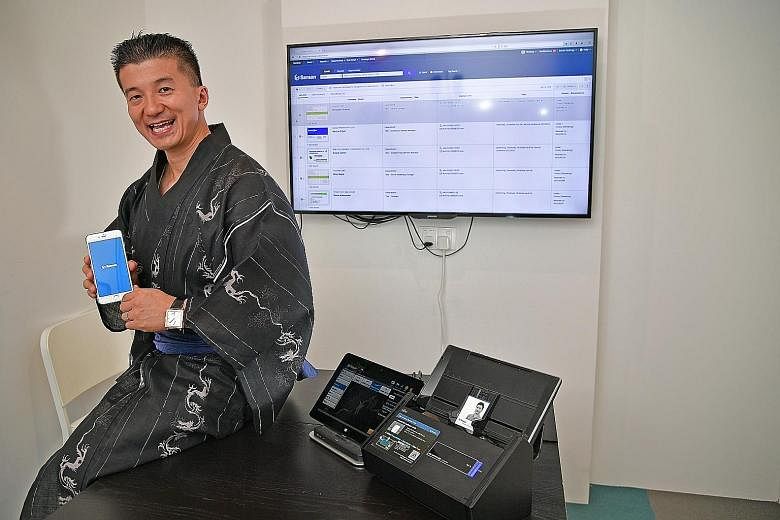Q What is Sansan?
A It all began when our founder, Mr Terada Chika, was working at a big trading firm in Japan. Once, it took him so many months to get an appointment with a potential client that he wanted to meet. When he finally secured the meeting, he was so proud of himself.
But when he returned to headquarters and was telling his colleagues about his achievement, a senior manager two ranks above him said: "Hey, I know that guy. Why didn't you just ask me for his contact?"
But of course you can't keep asking everybody all the time whether they know so-and-so.
So he realised that if you can share contacts across the organisation, then you'd know who among your colleagues knows certain people, and then you can ask that colleague to make an introduction.
And that colleague, too, won't have to spend time looking through his business cards to find that contact for you.
So what Sansan provides is a cloud-based solution to manage and share business contacts across an organisation.
Q How does it work?
A It's a very simple operation. Either you take a photo of the business card with our app or drop the card into a scanner that we provide - and that's it. Our technology does the rest.
Once the business card has been uploaded into our system and validated, you will see the contact information reflected in a comprehensive database that you can access on your computer or mobile device.
We've managed to achieve data accuracy of 99.9 per cent.
You can also make notes next to the contact information. For example, you might want to note that this person doesn't eat pork or likes red wine, or where you last met, which helps you and your team to build on that relationship.
And let's say you want to meet someone at Google. You can use the search function to look for Google, and you'll see all your colleagues on the database who have contacts at Google.
Or let's say you meet me today and I'm chief operating officer, but maybe in future I'm promoted to chief executive officer. If your colleague meets me then and uploads my new business card, the system will also alert you that my designation has changed.
Managing business cards is really unproductive work that adds no value, so our service helps you with that. But it's more than just about adding efficiency or reducing costs. It's about helping people build and improve relationships across their organisation.
Q Who is in your client base?
A We have 80 per cent market share in Japan and we have major Japanese conglomerates, financial institutions and government agencies as our clients.
When I joined the company last year, we had 4,000 clients in Japan, and now we have 5,500.
We've managed to grow so fast because our service is so easy to use, it's effective and it's secure.
In Japan, business cards are covered under the Personal Data Protection Act (PDPA), and so our technology ensures that when companies use our service, they are still compliant with the PDPA.
How it works is that when you scan a card or take a photo of it, our system will splice up the photo like a puzzle, and then the optical character recognition (OCR) software will analyse and transcribe the data on the card.
However, OCR technology is only about 80 per cent accurate. To get our level of accuracy - 99.9 per cent - we have a group of operators who then validate what the system has transcribed, and each operator only sees one piece of the puzzle.
That way, none of our operators will ever see the whole business card.
Only when everything is validated does the system join all the pieces back together and upload it onto the database.
Q How has reception been in Singapore so far?
A We've had good interest from both big and small companies.
One thing we were surprised by in Singapore is that companies really love our system because it helps them deal with staff who leave.
In Japan, people stay at their jobs for a very long time, but here, a lot of people change jobs quite frequently, and each time they leave a company, they take all their business cards with them.
One of my clients' friends lost almost 60 per cent of revenue after some of his company's salespeople left.
But with Sansan, it's okay if a salesperson leaves. We have captured their contacts, so the next salesperson who comes in can follow up.
We chose Singapore because not only is this one of the most sophisticated markets in the world, but we also feel that if we can capture the Singapore market, we can cover the rest of Asia.
There are lots of markets surrounding Singapore which pay attention to things happening here. So there's a domino effect - if we establish the brand here, it's easy for us to do marketing elsewhere.
And of course Asia is a growth market and Asean can't be ignored.
Q What's next for Sansan?
A This is our 10th year, but we have only had a year and a half of overseas operation.
We completed our Series C round of funding last year and hopefully we could launch an initial public offering sometime down the road, although we haven't set any target date.
Our top line is doubling every year, which is a good sign.
Ultimately, we want our service to be like a photocopy machine - every office using Sansan. Our system should be part of the basic business infrastructure for any firm.


